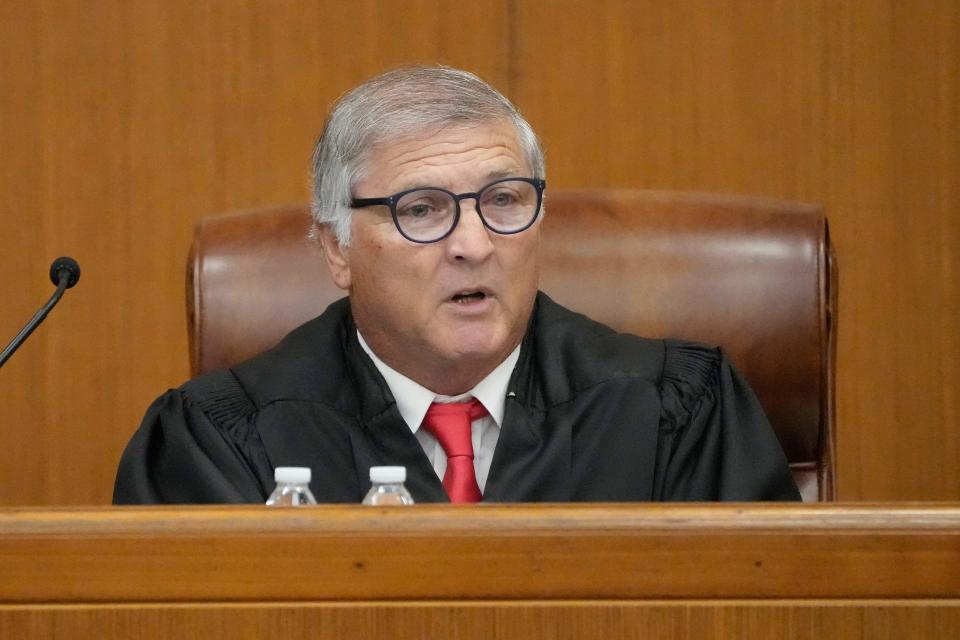Hinds County judge declines to block HB 1020, but federal order remains in effect for now
- Oops!Something went wrong.Please try again later.
A Hinds County Chancery Court judge has declined to stop House Bill 1020, the controversial Jackson courts and police bill, from becoming law on July 1, but a temporary restraining order granted by a federal judge that would block the bill remains in effect, at least for now.
A final judgment from Hinds County Chancellor Dewayne Thomas released Monday denied plaintiffs' requests to grant an injunction that would have kept the law off the books until legal battles have played out in state and county courts. By Monday afternoon, attorneys for the plaintiffs had announced plans to appeal the ruling to the Mississippi Supreme Court.
"Plaintiffs have failed to state a claim upon which relief may be granted," Thomas wrote in his final order.
"This case is immediately ripe for appellate review," he later wrote.
The plaintiffs in the case were three Hinds County residents who each testified last week that they felt their state constitutional rights would be violated by HB 1020 becoming law. The bill would see state officials appoint temporary unelected judges to the Hinds County court system, create a new unelected court system within the Capitol Complex Improvement District, increase the size of that district and expand the jurisdiction of the state-funded Capitol Police to include the entire city of Jackson.

The bill's supporters, including its primary authors Rep. Trey Lamar, R-Senatobia, and Sen. Brice Wiggins, R-Pascagoula, said it is intended to address crime in Jackson by expanding the role of the state-run police force and adding judges to reduce a judicial backlog.
Since it was first proposed earlier this year, the bill's opponents, including Democratic lawmakers from Jackson and Mayor Chokwe Antar Lumumba, have pointed to high levels of crime and even more severe judicial backlogs in other places in the state. They have also called the bill racist and said it is being imposed on a majority-Black city by a majority-white Legislature.
In his full opinion, which delved into further detail than the shorter final order, Thomas noted that arguing against the constitutionality of a law passed by the Legislature is always a high bar.
"A party seeking to have a statute declared unconstitutional in the state of Mississippi has a heavy burden: he must prove that the statute is unconstitutional 'beyond a reasonable doubt,'" Thomas wrote, citing a 1997 state supreme court opinion.
Thomas also noted the widespread criticism the bill has received from Hinds County leaders and residents.
"This Court is keenly aware of Plaintiff's frustration with the method by which HB1020 has been passed. This Court notes that the actions of many Mississippi Legislators have been severely criticized for lack of consideration of the desires of the citizens of the City of Jackson and Hinds County in pursuing the same," Thomas wrote. "The Court is cognizant of the cries of Plaintiffs, and numerous others, that the legislation is based on unfair and even racially motivated attempts to take over the Capital City. As a lifelong citizen of Hinds County and a lifelong friend and neighbor of many of those decrying the same, this Chancellor is not unmoved. However, Mississippi law is clear that this Court may not consider the motivation for the legislation or its policy."
Thomas further said that he could not consider the state's claims that the bill would improve the crime situation or the backlogs, as that would also be deciding based on motivation. Instead, Thomas said, the decision must only look at the constitutionality of the statute.
Wiggins shared his response to Thomas' decision Monday afternoon on Twitter.
"Chancellors have hard jobs. I see it everyday in my law practice and appreciate the decisions they have to make. Clearly, a thought out opinion," Wiggins said.
Chancellors have hard jobs. I see it everyday in my law practice and appreciate the decisions they have to make. Clearly, a thought out opinion. #msleg https://t.co/euljror2Yx
— Sen. Brice Wiggins (@bricewigginsMS) May 15, 2023
In a Monday afternoon joint statement, MacArthur Justice Center Director Cliff Johnson — who conducted much of the oral arguments last week on behalf of the plaintiffs — the Mississippi Center for Justice, Jxn Undivided Coalition, American Civil Liberties Union and NAACP Legal Defense Fund announced that the decision would soon be appealed.
"The three Jackson, Mississippi residents challenging H.B. 1020 in state court are deeply disappointed by Judge Thomas’s ruling and are prepared to take their fight to the Mississippi Supreme Court. They will file their Notice of Appeal tomorrow morning, and on appeal will argue that the plain language of the Mississippi Constitution demands that circuit court judges be elected and does not permit the four judicial appointments to the Hinds County Circuit Court required by H.B. 1020," the statement reads.
The decision in Hinds County Chancery Court came just three days after a temporary restraining order against the bill becoming law was granted in federal court by Southern District of Mississippi Judge Henry Wingate. That decision came in a separate case, filed by the NAACP, challenging the bill's compliance with federal law.
A hearing is scheduled in the federal case for May 22, when attorneys for the NAACP are expected to ask for a longer-term preliminary injunction, like the one the plaintiffs had sought from Thomas in the other case. If Wingate were to grant such an injunction, it could prevent the law from taking effect on July 1 if legal challenges are still ongoing at that point.
With Thomas' decision set to be appealed, and a restraining order granted by Wingate, HB 1020 still has hurdles to overcome before it would become law.
This article originally appeared on Mississippi Clarion Ledger: MS HB 1020 clears one court hurdle, but more stand in its way

